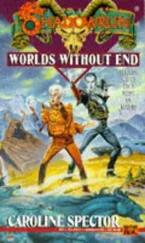Sime was looking terrified. “Will that protect us?” he said.
“To some degree,” Caris said. “Not completely.”
“But then it will be highly dangerous for us to attend the sick!”
Oonagh answered him. “We have no fear,” she said. “We look forward to death. For us, it is the longed-for reunion with Christ.”
“Yes, of course,” said Sime.
The next day, all the monks left Kingsbridge.
Gwenda felt murderously angry when she saw what Ralph had done to Davey’s madder plants. Wanton destruction of crops was a sin. There should be a special place in hell for noblemen who despoiled what peasants had sweated to grow.
But Davey was not dismayed. “I don’t think it matters,” he said. “The value is in the roots, and he hasn’t touched them.”
“That would have been too much like work,” Gwenda said sourly, but she cheered up.
In fact the shrubs recovered remarkably quickly. Ralph probably did not know that madder propagated underground. Throughout May and June, as reports began to reach Wigleigh of an outbreak of the plague, the roots sent up new shoots and, at the beginning of July, Davey decided it was time to harvest the crop. One Sunday Gwenda, Wulfric and Davey spent the afternoon digging up the roots. They would first loosen the soil around the plant, then pull it out of the ground, then strip its foliage, leaving the root attached to a short stem. It was back-aching work of the kind Gwenda had done all her life.
They left half the plantation untouched, in the hope that it would regenerate itself next year.
They pulled a handcart piled with madder roots back through the woods to Wigleigh, then unloaded the roots into the barn and spread them in the hayloft to dry.
Davey did not know when he would be able to sell his crop. Kingsbridge was a closed city. The people still bought supplies, of course, but only through brokers. Davey was doing something new, and he would need to explain the situation to his buyer. It would be awkward to do that through an intermediary. But perhaps he would have to try. He had to dry the roots first, then grind them to a powder, and that would take time anyway.
Davey had said no more about Amabel, but Gwenda felt sure he was still seeing the girl. He pretended to be cheerfully resigned to his fate. If he had really given her up, he would have moped resentfully.
All Gwenda could do was hope he would get over her before he was old enough to marry without permission. She still could hardly bear even to think of her family being joined to Annet’s. Annet had never ceased to humiliate her by flirting with Wulfric, who continued to grin foolishly at every stupid coquettish remark. Now that Annet was in her forties, with broken veins in her rosy cheeks and grey streaks among her fair ringlets, her behaviour was not just embarrassing but grotesque; yet Wulfric reacted as if she were still a girl.
And now, Gwenda thought, my son has fallen into the same trap. It made her want to spit. Amabel looked just like Annet twenty-five years ago, a pretty face with flyaway curls, a long neck and narrow white shoulders, and small breasts like the eggs that mother and daughter sold at markets. She had the same way of tossing her hair, the same trick of looking at a man with mock reproach and hitting his chest with the back of her hand in a gesture that pretended to be a smack but was in fact a caress.
However, Davey was at least physically safe and well. Gwenda was more worried about Sam, living now with Earl Ralph at the castle, learning to be a fighting man. In church she prayed he would not be injured hunting, or learning to use a sword, or fighting in a tournament. She had seen him every day for twenty-two years, then suddenly he had been taken from her. It’s hard to be a woman, she thought. You love your baby with all your heart and soul, and then one day he just leaves.
For several weeks she looked for an excuse to travel to Earlscastle and check on Sam. Then she heard that the plague had struck there, and that decided her. She would go before the harvest got under way. Wulfric would not go with her: he had too much to do on the land. Anyway, she had no fear of travelling alone. “Too poor to be robbed, too old to be raped,” she joked. The truth was that she was too tough for either. And she carried a long knife.
She walked across the drawbridge at Earlscastle on a hot July day. On the battlements of the gatehouse a rook stood like a sentry, the sun glinting off his glossy black feathers. He cawed a warning at her. It sounded like: “Go, go!” She had escaped the plague once, of course; but that might have been luck: she was risking her life by coming here.
The scene in the lower compound was normal, if a little quiet. A woodcutter was unloading a cart full of firewood outside the bakehouse, and a groom was unsaddling a dusty horse in front of the stables, but there was no great bustle of activity. She noticed a small group of men and women outside the west entrance of the little church, and crossed the baked-earth ground to investigate. “Plague victims inside,” a maidservant said in answer to her inquiry.
She stepped through the door, feeling dread like a cold lump in her heart.
Ten or twelve straw mattresses were lined up on the floor so that the occupants could face the altar, just as in a hospital. About half the patients seemed to be children. There were three grown men. Gwenda scanned their faces fearfully.
None of them was Sam.
She knelt down and said a prayer of thanks.
Outside, she approached the woman she had spoken to earlier. “I’m looking for Sam from Wigleigh,” she said. “He’s a new squire.”
The woman pointed to the bridge leading to the inner compound. “Try the keep.”
Gwenda took the route indicated. A sentry at the bridge ignored her. She climbed the steps to the keep.
The great hall was dark and cool. A big dog slept on the cold stones of the fireplace. There were benches around the walls and a pair of large armchairs at the far end of the room. Gwenda noticed that there were no cushions, no upholstered seats and no wall hangings. She deduced that Lady Philippa spent little time here and took no interest in the furnishings.
Sam was sitting near a window with three younger men. The parts of a suit of armour were laid out on the floor in front of them, arranged in order from faceplate to greaves. Each of the men was cleaning a piece. Sam was rubbing the breastplate with a smooth pebble, trying to remove rust.
She stood watching him for a moment. He wore new clothes in the red-and-black livery of the earl of Shiring. The colours suited his dark good looks. He seemed to be at ease, talking in a desultory way with the others while they all worked. He appeared healthy and well fed. It was what Gwenda had hoped for, but all the same she suffered a perverse pang of disappointment that he was doing so well without her.
He glanced up and saw her. His face registered surprise, then pleasure, then amusement. “Lads,” he said, “I am the oldest among you, and you may think I’m capable of looking after myself, but it’s not so. My mother follows me everywhere to make sure I’m all right.”
They saw her and laughed. Sam put down his work and came over. Mother and son sat on a bench in a corner near the staircase that led to the upstairs rooms. “I’m having a wonderful time,” Sam said. “Everyone plays games here most days. We go hunting and hawking, we have wrestling matches and contests of horsemanship, and we play football. I’ve learned so much! It’s a bit embarrassing to be grouped with these adolescents all the time, but I can put up with that. I just have to master the skill of using a sword and shield while riding a horse at the same time.”
Читать дальше












